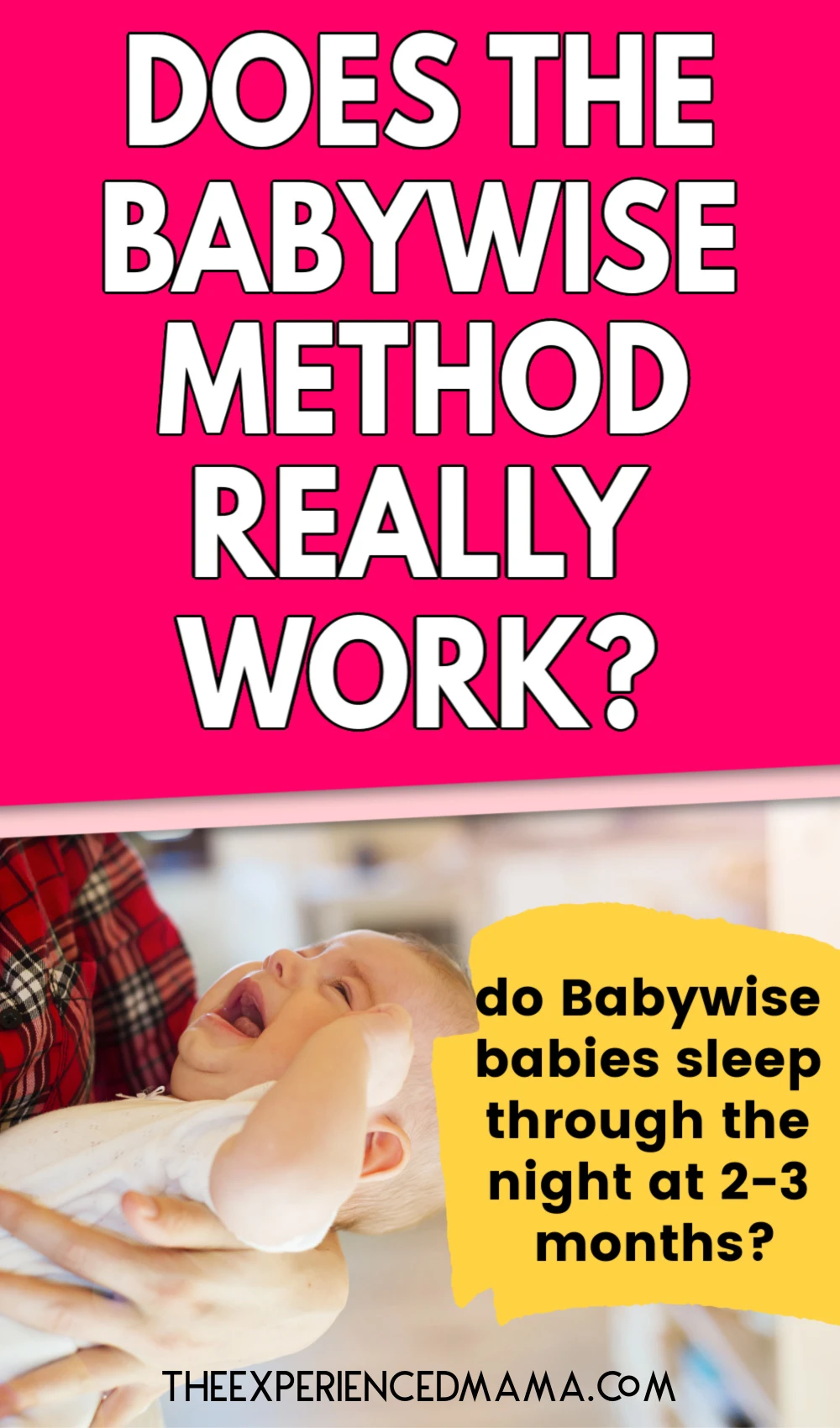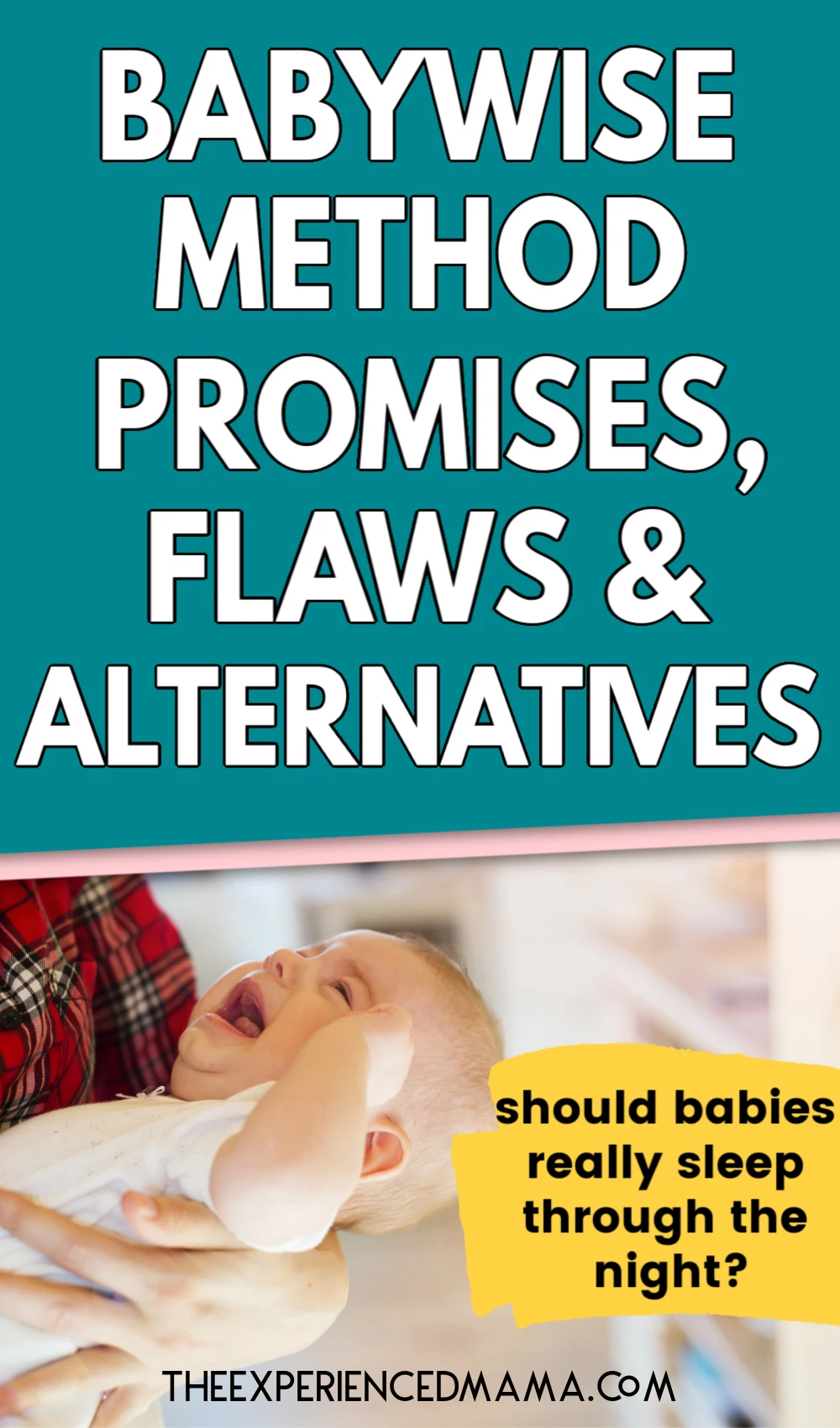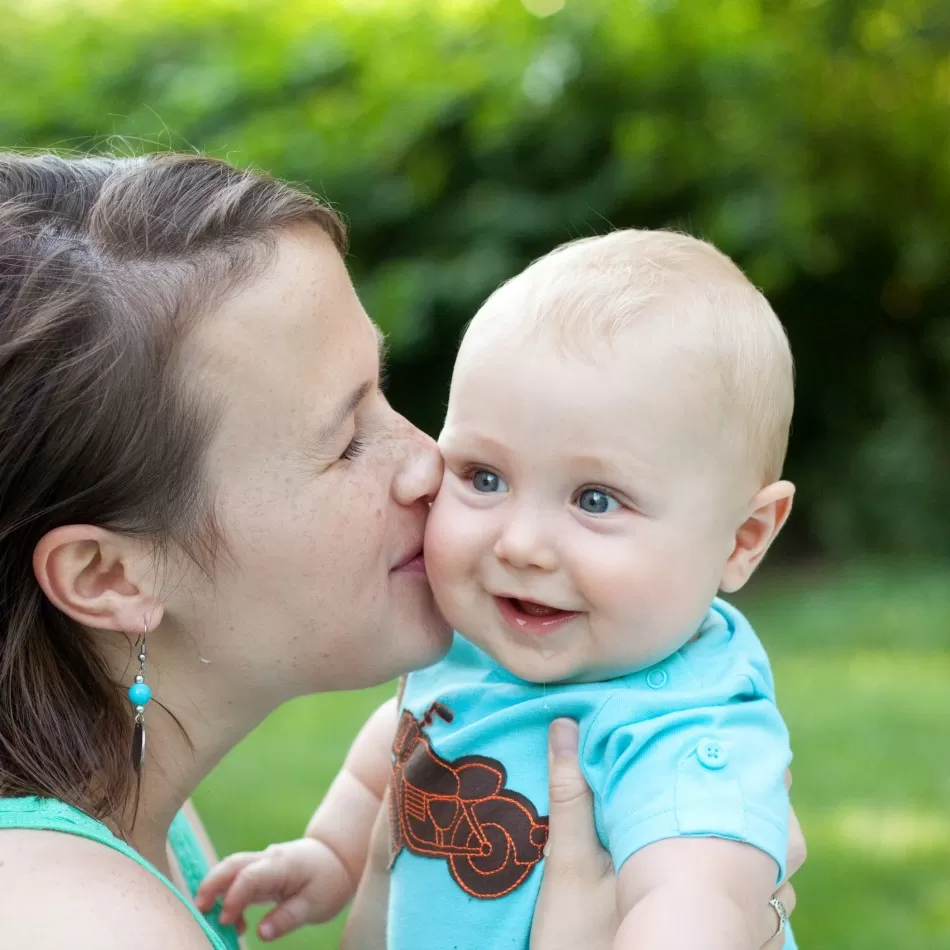Inside: The Babywise method for sleep training and caring for your new baby comes with strong recommendations and strict schedules – all promising “the gift of nighttime sleep.” But does it work? This in-depth review examines the promises Babywise makes and whether or not the desired outcome – getting your baby to sleep through the night – is worth the parenting compromises Babywise suggests you make.
When I was a brand new mom, I happened to be in friend circles with more experienced moms who ate, breathed, and slept “Babywise”. Their babies apparently slept through the night at 6-8 weeks, took regular naps and kept predictable schedules – schedules set by the parents, not the babies.
As an A-type control freak, the Babywise method sounded pretty darn good.
I devoured the book, and as soon as my baby was born, I tried to implement the Babywise schedule with all the Babywise rules. I did my best, but no matter what I did my baby wouldn’t sleep for longer than 45 minute stretches.
That didn’t fit the Babywise schedule AT ALL, and the author(s) offered very little advice on what to do if your baby didn’t fit the schedule.
I was constantly an angry mom or a sobbing mom – or both. Why, oh why, did it seem to work so well for my friends, but not for me?!
So what is the Babywise method and does it actually work?

What is the Babywise Method?
THIS POST PROBABLY CONTAINS AFFILIATE LINKS. IF YOU LIKE LEGAL JARGON, YOU CAN READ OUR FULL DISCLOSURE POLICY HERE.
The Babywise method as a whole is a series of parenting books offering parenting advice on every stage of development.
If you’re new to Babywise, the authors are Christians and frequently use the Bible to support their recommendations.
The first and most popular book in the series On Becoming Babywise specifically offers instructions for how to get your baby to sleep, eat and play on a predictable schedule.
The basic premise is that babies should operate on a 2.5-3 hour cycle during the day in this order: eat, play, sleep.
Parents should feed babies until full in a single feeding session. The book offers suggestions on how long these feeding sessions should last depending on the age of your baby.
After eating, your baby should play, or simply have awake time. Finally, the baby should be put down to sleep when drowsy – nursing to sleep is highly discouraged.
The authors give very specific schedules for how often and how long a baby should be eating, sleeping and playing at every age – newborn, 3 months, 6 months and beyond.
There is very little room for deviating from the schedule, and parents are encouraged to work toward the ideal schedule. Crying it out is approved of and even encouraged:
Crying for 15-20 or even 30 minutes is not going to hurt your baby physically or emotionally, especially if the cry is a continual start-stop cry. He will not lose brain cells, experience a drop in IQ, or have feelings of rejection that will leave him manic depressive at age thirty (Gary Ezzo, Babywise author).
It should be noted that these claims directly contradict several research studies on the negative effects of allowing your baby to cry it out on a regular basis.
Related: Why I Quit Cry it Out (and I’m so glad I did)

3 Obvious Reasons the Babywise Method Appeals to New Parents
Yes, it looks good on the outside. Here’s the appeal…
1. Sleep
The selling point of its author is in the tagline of the book: “giving your child the gift of nighttime sleep.”
The book is marketed as “the #1 bestselling book on nighttime sleep”, which I find believable simply because what new parents want more than anything is to get their baby to sleep.
Having just made it through another first year with baby #5, I am fresh off the extreme sleep deprivation that is new parenthood. My husband was so desperate he *almost* bought this $500 bed. Thankfully I stopped before he clicked, “Buy!”
I remember the foggy haze I felt the first few years of motherhood, especially after babies number one and two. It makes you pretty desperate.
Also, in our world where more and more moms are working, we’ve become more and more obsessed with getting babies to comply with our need as parents for more sleep.
So if the method actually works for your baby? Then an obvious benefit is more sleep for YOU!
2. Predictable, Parent-Directed Schedule
If you are a parent who highly values order and strict schedules, Babywise also claims to offer you, the parent, the ability to dictate your daily schedule.
If you have a compliant baby who easily adapts to the Babywise schedule, I can see this being a valid selling point. It can work especially well when you only have one child, and you have all the time in the world to spend getting your child to adapt to the schedule (and it will take time, believe you me).
When I was trying to use the Babywise method, I spent a LOT of time trying to get my baby to go back to nap after waking up before the prescribed amount of time (which throws off the entire Babywise schedule by the way), soothing a hungry baby I wasn’t “supposed” to feed yet, and trying to force my baby to go to sleep when she wasn’t tried…but it was “time to sleep”.
I spent a LOT of time and energy trying to get my baby to conform to the schedule.
3. A Happier Baby
One of the major claims of the book is that a baby who sleeps through the night is a happier baby while awake.
I suppose this might be true, but how can you possibly make that claim unless you also are observing more than just a few babies whose moms do not use the Babywise method?
And are those moms whose babies are happy with attachment parenting going to be reporting about their happy babies? Moms typically take to online forums looking for advice for problems, not to brag about their lack of problems.
Whether or not Babywise babies are actually happier or more content is debatable.
5 Problems with the Babywise Method for Sleep Training
Here are the main arguments against the Babywise method.
1. Breastfeeding babies are not biologically wired to “sleep through the night”.
“Sleep through the night” is a very misleading phrase. When moms claim their babies “sleep through the night”, they can mean anywhere from 5-10 hours.
If you are breastfeeding, breastmilk digests quickly, meaning your baby really WILL be hungry every 2-3 hours. Formula feeding is a whole different ballgame, and it is reasonable to expect formula fed babies to sleep through the night at an earlier age because babies do not digest formula as quickly as they do breastmilk.
Not only are they not biologically wired to sleep longer than 3-4 hour stretches, it is actually dangerous for them to do so when they are very young – just months old.
Mother nature designed newborns to wake every two hours, feed, seek comfort and go back to sleep: she didn’t do this as a cruel joke to harass or torture parents. She did it to protect babies, to keep them safe as they learn how to breathe and to nurture an unshakeable connection with their ultimate protectors (source).
In our modern and demanding culture, we have an unrealistic expectation that babies sleeping through the night is normal and achievable.
The babies that do sleep through the night from 2 or 3 or 4 months on? I believe they are the outliers, though I have no scientific evidence to back that up.
But they are the ones you hear about because those moms tend to be pretty vocal about their success. They aren’t bragging – they just genuinely want you, their mom friend, to experience good sleep, too.
When really, we’re setting mothers up to fail.
2. The only way babies can communicate is through crying, and extended crying leads to extended periods of high cortisol levels, which have negative health effects. …Yet Babywise repeatedly encourages parents to ignore their baby’s crying and let them “cry it out”.
When babies cry for extended periods of time, their bodies release more and more cortisol – the stress hormone – which builds up in their bodies.
Proponents of letting babies cry it out often claim that tears are a stress-reliever and good for babies, when scientists know the opposite is true:
Scientists have known for years that elevated cortisol levels interfere with learning and memory, lower immune function and bone density, increase weight gain, blood pressure, cholesterol, and heart disease—the list goes on. Chronic stress and elevated cortisol levels also increase one’s risk for depression, mental illness, and lower life expectancy (source).
Encouraging parents to inflict stress on their babies on an almost daily basis? We are harming our children.
Gary Ezzo, Babywise author states:
Crying for 15-20 or even 30 minutes is not going to hurt your baby physically or emotionally, especially if the cry is a continual start-stop cry. He will not lose brain cells, experience a drop in IQ, or have feelings of rejection that will leave him manic depressive at age thirty.
I am not saying that you should never leave your baby to cry.
There are times when you just can’t handle it anymore, and you need to lay your baby down gently and walk away for a few minutes.
This is especially true if you are experiencing postpartum depression.
What I am saying is that using cry it out on a regular basis harms babies, something the Babywise make a point to deny and refute with no support for their claims.
3. Babies breastfeed for more than just nutrition and sustenance – they breastfeed for comfort.
The Babywise method specifically discourages you from feeding your baby at any other time than the prescribed schedule. You are not supposed to breastfeeding at any time for comfort.
Scientific studies have proven that babies breastfeed for comfort, that they are soothed by both sucking, the breastmilk itself, and by being held.
We’ve all heard about the babies in third world orphanages from lack of touch. Touch is a genuine NEED for babies.
Mothers all over the world have been using breastfeeding for centuries to comfort their babies well into their toddler years and beyond.
Only with the demands of our modern world, the crazy hectic schedules, have we decided breastfeeding for comfort is not an acceptable practice, and it’s just not true.
4. The authors of Babywise offer very little guidance if your baby does not follow the prescribed schedule.
As a rule-following, formerly A-type mom who tried to implement Babywise, there was absolutely no guidance offered when your baby doesn’t follow the schedule.
Your only options are to feed your crying baby when it’s “not time yet” and “your baby shouldn’t be hungry” or endure crying until the schedule approves you feed him.
Parents who adhere too strictly to the Babywise method, using the recommended schedules without deviating, put their babies at risk of dehydration. The American Academy of Pediatrics has shown that using the Babywise method has been linked to failure to thrive (source).
5. Babywise authors falsely claims that all of their advice is biblical.
Babywise appeals to new Christian parents who have been told by Christian mentors or leaders that controlling babies and children through various forms of punishment – often disguised as discipline – is biblical.
Those same leaders also claim the family should always be parent-centered – never child-centered (why it has to be one or the other, I’m not sure).
They usually also claim that if you don’t spank your children, you are disobeying God.
Beyond disobeying God, the authors of Babywise, and Christian leaders who think similarly, claim that authoritarian parenting is the only way your child will ever follow God and “be saved”.
And let me tell you: fear of your child going to hell is a pretty strong motivator.
The Underlying Premise of the Babywise Method
The heart of the Babywise method is quite simple, really: children need to be and should be micromanaged and controlled, and that you, the parent, can and should control your children.
You, the parent, dictate:
- when and how much they need to eat,
- when and how much sleep they need,
- when, where and how they play
The Babywise method is a classic example of authoritarian parenting. Authoritarian is defined as, “favoring or enforcing strict obedience to authority, especially that of the government, at the expense of personal freedom.”
Babywise demands fairly strict obedience and compliance from the earliest ages.
During the baby years, parents exert control by not responding to baby’s cries if the parent judges the baby to be full and doesn’t want anything except to be picked up.
The authors encourage parents to feed their babies according to the prescribed schedule (although they occasionally throw in a, “Of course, if your baby is hungry, you should feed him”, much to the confusion of new moms).
Nursing your baby to sleep or solely for comfort is strongly discouraged.
The appeal is all under the false premise that making your child eat, sleep and play on a prescribed schedule is 1) possible and 2) doable.
While yes, it is possible to control another human being, control is usually achieved by withholding something from your child (like not picking her up when she cries) or inflicting pain (either physical or emotional) to produce the desired behavior.
Neither of those things are good or biblical parenting.
You also can make your child stay in a crib alone, but you cannot make them sleep. You can put your baby to your breast, but you cannot make him eat if he isn’t hungry or doesn’t want to (I’ve tried).
In the short-term, they may appear to make your life easier, but research has consistently proven that these methods result in negative life outcomes.
Is the Babywise Method Really Biblical?
As a Christian myself, I find it deplorable and horrifying that the entire book is supposedly biblically based.
Much of the recommendations are wrongly tied to Scripture, and as another blogger also noted, many developmental issues are made into moral ones.
There is no biblical support for letting a baby cry it out or putting a baby on a strict schedule – it’s a parenting approach and choice. In fact, I would argue that there is FAR MORE biblical support for attachment parenting and comfort nursing than there is for crying it out.
And yet the authors discourage, shame and even condemn parents who choose attachment parenting and demand feeding.
A baby crying is NOT a sign of a sinful nature!!! I can’t add enough exclamation marks to this one.
If you choose to demand feed your infant, you are responding to his physical AND emotional needs. Breastfeeding has been proven again and again to be just as much about comfort as it is nutrition.
A baby crying is a little person adjusting to an entirely new environment, who was suddenly removed from the only home its ever known and is frequently cold, hungry and wet, something it never was before.
Crying sounds perfectly normal to me in this situation. It’s the ONLY way for that baby to communicate her needs and wants.
Unless you really need a few minutes to take a shower or get some space because that crying is making you angry, crying deserves a caring response.
Is it hard as parents to adjust to all that crying? Heck, yes!
You’re introducing another person into your family, a needy human with a new and unknown personality. It’s supposed to be hard.
I just discovered THIS amazing parenting book this year, and I love how this author challenges the long-standing loud voices in the evangelical Christian world, including Gary Ezzo. She presents compelling arguments against authoritarian parenting, demonstrating instead the biblical support for attachment and/or gentle parenting.
You can also find several quotes from Babywise author compiled in a series of posts HERE. All of the quotes together offer so much insight into his worldview and parenting philosophy.

But Does the Babywise Method Actually Work?
I have friends who swear by Babywise for sleep training, and I believe that they aren’t lying. Their babies DO sleep through the night at young ages, some as early as 8 weeks.
Are they happier, more well-rested moms because of it? Possibly.
More well-rested yes, but only happier if they truly believe that schedules and crying it out fits their parenting styles and is the right thing to do (not the case for me).
Are their babies happier or less fussy? Maybe so. But that’s a pretty subjective assessment.
Were their babies harmed in the process from crying it out for long periods of time? I hope not, but I honestly don’t know.
Personally, I used the cry it out method every night for one week when my baby was around six months old.
At that time, she would wake up every single night at 2 a.m.
And my baby DID finally “sleep through the night” using the cry it out method (it took 45 minutes each time)….only to start waking up again at the exact same time a week later. Lying in bed hearing her crying was so devastating the first time around, I couldn’t stomach it again.
Losing a little sleep was worth it to me, and I never used cry it out again after that time.
That same child had extreme difficulty falling asleep and still does. I would lay with her for an hour or more every night, and that’s what it took for her to fall asleep.
She never fell asleep before 9 o’clock no matter what I did.
She also woke up every single night at 2 a.m. to be close to me until she was 7-years-old. And I tried every trick in the book to get her to stop.
Probably only one of my babies would have done well with the Babywise method, and he slept all.the.time. People would ask me if I even had a baby because he was always sleeping, and he slept through the night on his own around 9-months-old.
So does Babywise work? I think it takes the right babies with the right moms, moms who actually believe in the Babywise method and can view it with flexiblity, to have it “work”.
The moms I’ve seen it work best for do lean towards authoritarian parenting and who like to keep relatively strict schedules in their homes. If your baby is more compliant and flexible and tends towards the higher end of the sleep need scale, you will probably have much more success than I did.
Related: I Quit Babywise, and I’m SO Glad I Did
Alternatives to the Babywise Method
If you are looking for something similar to Babywise without the rigidity and authoritarian parenting methods, I recommend trying the Secrets of the Baby Whisperer. It’s what I turned to when I stopped using Babywise, and I found it a much gentler alternative.
Instead of schedules, author Tracy Hogg encourages routines that look similar to Babywise schedules, but with a lot more flexibility and compassion built in (and without turning development issues into moral ones).
The Baby Whisperer also does an excellent job of addressing the different temperaments of babies and how to adjust your routine based on that temperament. In fact, she devotes an entire second book JUST for trouble-shooting.
The Baby Whisperer helped me to find some kind of rhythm with my babies without feeling bound to rules my baby was constantly “breaking”.
I also didn’t miss that persistent feeling of failure that accompanied my babies not conforming to the Babywise schedule, even though I later realized it wasn’t actually my fault.
My favorite author for all things gentle Christian parenting is L.R. Knost. You can find her books HERE.
Final Thoughts on the Babywise Method
I eventually swung to the other end of the parenting spectrum so-to-speak – adopting parenting practices I never dreamed in a million years would be something I’d do:
- demand feeding
- co-sleeping
- not disciplining for toddler tantrums
The list goes on.
The residue of Babywise parenting philosophies remain in the recesses of my brain, and to be honest, they came from my own childhood as well. They come out in moments of stress and sleep deprivation, and to be honest, those moments frighten me.
I have to work extremely hard at retraining my brain to respond to my babies and my children in ways that align with my new parenting philosophies.
I read Raised Good and Parenting from the Heart on a regular basis.
I read books on gentle and respectful parenting.
I talk to other moms who follow the same parenting philosophies, although to be honest, they can be difficult to find sometimes.
Like any other parent, I love my sleep, and I look forward to the day when I will sleep through the night again. I take naps when I’m extremely tired.
But using harmful sleep training methods like the Babywise method to get more sleep now, when my babes are still so small and vulnerable? It’s just not worth it.
Read Next: How to Survive Your First Few Weeks with a Newborn

Owner of Growing Serendipity, June could talk to you all day about homeschooling, parenting, and minimalism, which she does at This Simple Balance. When she’s not homeschooling, decluttering, or blogging, she loves to enjoy perfect silence while sipping a hot cup of coffee and thinking uninterrupted thoughts—which, of course, with five kids, doesn’t happen very often.